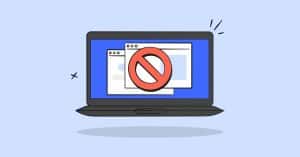Introduction
What websites are blocked at school? Schools are wrestling with the issues brought by unlimited internet access as technology continues to influence our lives. Many educational institutions have installed web filtering systems to restrict specific websites in order to maintain a focused and productive learning atmosphere. These technologies are designed to keep students away from improper, distracting, or potentially harmful content. In this article, we will look at the types of websites that are typically prohibited at school and analyse why these limitations exist. For diverse school websites read this article.
Understanding Web Filtering
Web filtering is a technology used by schools to limit and monitor their students’ internet usage. It entails the deployment of software or hardware to analyse online traffic and restrict access to specific websites based on specified criteria. Adult content, violence, gambling, social media, and internet gaming are examples of such criteria. Schools may establish a safer online environment and encourage students to use the internet responsibly by deploying web blocking.
Categories of Blocked Websites
Social Media Platforms
Social networking platforms are one of the most regularly prohibited types of websites in schools. Websites like as Facebook, Instagram, Twitter, and Snapchat are frequently blocked owing to the risk of distraction and harassment. While social media can be a useful tool for communication and networking, it can also take up a lot of time and distract from academic work.
Streaming and Entertainment Sites
Streaming websites such as YouTube, Netflix, and Hulu are routinely prohibited in educational contexts. These platforms offer a diverse selection of videos, movies, and TV episodes that can be entertaining but typically lack instructional value. Furthermore, streaming sites might require a large amount of bandwidth, affecting overall network speed for academic reasons.
Online Gaming
Schools frequently prohibit online gaming websites and platforms owing to worries about addiction, improper material, and the possibility for online predators. To preserve a safe and appropriate learning environment, games that feature violence or promote gambling are often forbidden. While gaming can be beneficial to education in certain situations, schools must create a balance between enjoyment and academic demands.
Adult Content and Inappropriate Material
One of the key purposes of school-based web filtering systems is to keep students from accessing adult content and improper information. Websites with explicit images, videos, or text are strictly prohibited in order to prevent students from exposure to explicit content and to create a safe digital environment. To identify and restrict access to such websites, filtering systems use various approaches such as keyword analysis and blacklisting.
Proxy and VPN Sites
Schools frequently ban proxy and Virtual Private Network (VPN) sites to prevent pupils from circumventing online filtering rules. These websites redirect users’ internet traffic through external servers, allowing them to browse the internet anonymously or access banned content. Schools hope to keep control over internet usage on their network by restricting proxy and VPN services.
The Rationale behind Blocking Websites
Several variables influence the decision to prohibit specific websites at school. For starters, schools must create a safe and secure atmosphere for their pupils. They hope to safeguard pupils from cyberbullying, explicit material, and other internet threats by blocking access to potentially dangerous or improper materials. Second, blocking specific websites helps students focus on educational objectives and reduces distractions that may interfere with learning outcomes. Finally, web filtering allows schools to meet regulatory requirements for child protection and internet safety.

Controversies and Challenges
While online filtering systems are established with the best of intentions, they are frequently met with criticism and problems. Critics say that overly tight web filtering can limit students’ access to valuable educational resources while also limiting their exposure to varied viewpoints. In some cases, web filters have unintentionally blocked websites that include valuable instructional or research materials. This can be difficult for teachers and students who rely on the internet for academic purposes.
Another problem is the ever-changing nature of websites and online information. Every day, new websites are formed, and existing websites may change their content or domain names. To successfully prevent newly developing inappropriate or hazardous websites, web filtering systems must constantly adapt and update their databases. However, for schools and IT administrators, this can be a time-consuming and resource-intensive operation.
Furthermore, some say that online filtering should be accompanied by education and instruction on safe internet use. Rather of depending simply on restrictions, schools can teach kids how to navigate the internet world safely, assess material critically, and make responsible decisions when accessing online content. Schools may enable children to be responsible digital citizens by combining web filtering with comprehensive digital literacy programmes.
Finally, schools frequently ban websites such as social networking, streaming and entertainment, internet gaming, adult content, and proxy/VPN services. These limits are in place to provide children with a safer and more focused learning environment. While web filtering systems have advantages in terms of student safety and distraction reduction, they are not without obstacles and controversy. It is still difficult to strike the right balance between blocking access to unsuitable content and offering access to instructional resources. Schools may ensure that their students have a safe and productive online learning experience by constantly analysing and refining their web filtering policies. Furthermore, combining web filtering with comprehensive digital literacy education can equip kids with the knowledge they need to browse the internet safely and make educated decisions about their online activity. What websites are blocked at school?






